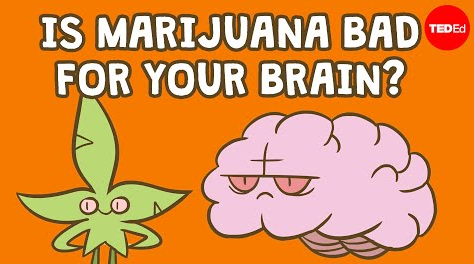In 1970, marijuana was classified as a schedule 1 drug in the United States:
1970年,大麻在美国被归为一级管制药物:
the strictest designation possible, meaning it was completely illegal and had no recognized medical uses.
即最严格的管理类型,意味着它完全非法,且毫无医疗用途。
For decades, this view persisted and set back research on the drug's mechanisms and effects.
这种观点一直持续了几十年,阻碍了对大麻机制和效用的研究。
Today, marijuana's therapeutic benefits are widely acknowledged, and some nations have legalized medical use or are moving in that direction.
如今,大麻的治疗功效得到了广泛的认可,而且一些国家已经或正在使大麻的医用合法化。
But a growing recognition for marijuana's medical value doesn't answer the question: is recreational marijuana use bad for your brain?
但大麻的医疗价值被认可并不能解答一个问题:使用娱乐性大麻是否对大脑有害?
Marijuana acts on the body's cannabinoid system, which has receptors all over the brain and body.
大麻作用于人体的内源性大麻素系统,这一系统的受体遍布大脑和人体。
Molecules native to the body, called endocannabinoids, also act on these receptors.
人体自然生产的内源性大麻素分子,同样也作用于那些受体。
We don't totally understand the cannabinoid system, but it has one feature that provides a big clue to its function.
我们还没有完全了解内源性大麻素系统,但它的一个特性为我们了解其功能提供了很重要的线索。
Most neurotransmitters travel from one neuron to the next through a synapse to propagate a message.
大多数神经递质从一个神经元移动到下一个,通过突触传递消息。
But endocannabinoids travel in the opposite direction.
而内源性大麻素往相反的方向移动。
When a message passes from the one neuron to the next, the receiving neuron releases endocannabinoids.
当消息从一个神经元传递到下一个,接收神经元释放出内源性大麻素。
Those endocannabinoids travel backward to influence the sending neuron -- essentially giving it feedback from the receiving neuron.
这些内源性大麻素往回移动至发送神经元,给予其接收神经元的反馈。
This leads scientists to believe that the endocannabinoid system serves primarily to modulate other kinds of signals -- amplifying some and diminishing others.
这一机制使得科学家们认为内源性大麻素系统主要负责调控其他种类的信号,即放大信号或缩小信号。
Feedback from endocannabinoids slows down rates of neural signaling.
内源性大麻素的反馈使得神经元信号传递速度减慢。
That doesn't necessarily mean it slows down behavior or perception, though.
但这并不意味着行为或感知速度的减慢。
For example, slowing down a signal that inhibits smell could actually make smells more intense.
例如,减慢抑制嗅觉的信号反而使得闻到的气味更加强烈。
Marijuana contains two main active compounds, tetrahydrocannabinol or THC, and cannabidiol, or CBD.
大麻含有两种主要的活性化合物:四氢大麻酚(THC)和大麻二酚(CBD)。
THC is thought to be primarily responsible for marijuana's psychoactive effects on behavior, cognition, and perception,
THC被认为主要负责产生大麻的精神影响,包括行为、认知以及感知,
while CBD is responsible for the non-psychoactive effects.
而CBD负责产生非精神类影响。
Like endocannabinoids, THC slows down signaling by binding to cannabinoid receptors.
和内源性大麻素类似,THC通过与大麻素受体结合来减缓信号的传递。
But it binds to receptors all over this sprawling, diffuse system at once,
不同的是,它会立即与遍布全身的大麻素系统中的所有受体结合,
whereas endocannabinoids are released in a specific place in response to a specific stimulus.
而内源性大麻素仅在特定部位产生,对特定的刺激作出反应。

This widespread activity coupled with the fact that the cannabinoid system indirectly affects many other systems,
这种大范围的影响,以及内源性大麻素系统对很多其他系统的间接影响,
means that each person's particular brain chemistry, genetics, and previous life experience largely determine how they experience the drug.
意味着每个人独有的脑化学、遗传学以及之前的生活经历,在很大程度上决定了他们对这种药物的体验。
That's true much more so with marijuana than with other drugs that produce their effects through one or a few specific pathways.
相较于其他只通过一种或几种特定的途径产生作用的药物,大麻更是如此。
So the harmful effects, if any, vary considerably from person to person.
因此,不良影响,如果存在的话,非常因人而异。
And while we don't know how exactly how marijuana produces specific harmful effects,
虽然我们不了解大麻究竟怎样产生特定的不良影响,
there are clear risk factors that can increase peoples' likelihood of experiencing them.
但我们可以明确一些会增加不良影响概率的风险因子。
The clearest risk factor is age. In people younger than 25, cannabinoid receptors are more concentrated in the white matter than in people over 25.
最显而易见的风险因子是年龄。对于小于25岁的人,大麻素受体更集中于脑白质中。
The white matter is involved in communication, learning, memory, and emotions.
脑白质参与人的交流、学习、记忆以及情感。
Frequent marijuana use can disrupt the development of white matter tracts, and also affect the brain's ability to grow new connections.
经常使用大麻会扰乱脑白质神经束的发育,并且会影响大脑形成新连接的能力。
This may damage long-term learning ability and problem solving.
由此可能会破环长期的学习能力以及解决问题的能力。
For now, it's unclear how severe this damage can be or whether it's reversible.
目前,尚不清楚这一损害的严重程度以及是否可逆。
And even among young people, the risk is higher the younger someone is -- much higher for a 15 year old than a 22 year old, for instance.
甚至对于年轻人来说,越年轻则风险越高,例如,15岁的人会比22岁的人风险高很多。
Marijuana can also cause hallucinations or paranoid delusions.
大麻还会引起幻觉或妄想症。
Known as marijuana-induced psychosis, these symptoms usually subside when a person stops using marijuana.
这些症状统称为大麻引起的精神病,通常会随着大麻的停用而消退。
But in rare cases, psychosis doesn't subside, instead unmasking a persistent psychotic disorder.
但在极少数情况下,这些症状不会消退,意味着一种持续性的精神病。
A family history of psychotic disorders, like schizophrenia, is the clearest, though not the only, risk factor for this effect.
精神病家族病史,例如精神分裂,是产生这一效应最为明显的危险因子之一。
Marijuana-induced psychosis is also more common among young adults, though it's worth noting that psychotic disorders usually surface in this age range anyway.
大麻引起的精神病也在年轻人中更为常见,尽管值得注意的是,无论如何,精神病通常都会在这个年龄段出现。
What's unclear in these cases is whether the psychotic disorder would have appeared without marijuana use
无法明确的是,若不使用大麻,精神病是否仍旧会产生,
whether marijuana use triggers it early, is a catalyst for a tipping point that wouldn't have been crossed otherwise,
大麻是否会促使其提前发生,它是一个促使病症越过临界点的催化剂,
or whether the reaction to marijuana is merely an indication of an underlying disorder.
或者对大麻的反应只是一个潜在疾病的象征。
In all likelihood, marijuana's role varies from person to person.
大麻的作用很可能因人而异。
At any age, as with many other drugs, the brain and body become less sensitive to marijuana after repeated uses, meaning it takes more to achieve the same effects.
在任何年龄,如同使用其他很多药物,大脑和身体会随着大麻的重复使用而对其敏感性降低,这意味着需要使用更多药量以达到相同效果。
Fortunately, unlike many other drugs, there's no risk of fatal overdose from marijuana,
幸运的是,不像其他很多药物,大麻没有过量致命的风险,
and even heavy use doesn't lead to debilitating or life-threatening withdrawal symptoms if use stops.
甚至大量使用也不会导致虚弱乏力,停止使用也不会产生威胁生命的戒断症状。
There are more subtle forms of marijuana withdrawal, though,
不过,戒断大麻有着更微妙的症状,
including sleep disturbances, irritability, and depressed mood, which pass within a few weeks of stopping use.
例如睡眠障碍,烦躁不安和情绪低落,它们都会在停用几周内消失。
So is marijuana bad for your brain? It depends who you are.
所以大麻对大脑有害吗?这取决于你是谁。
But while some risk factors are easy to identify, others aren't well understood
但尽管一些危险因子很容易被确认,我们对其他危险因子还不了解,
which means there's still some possibility of experiencing negative effects, even if you don't have any of the known risk factors.
这意味着即使你不具有任何已知的危险因子,仍有可能存在负面影响。


